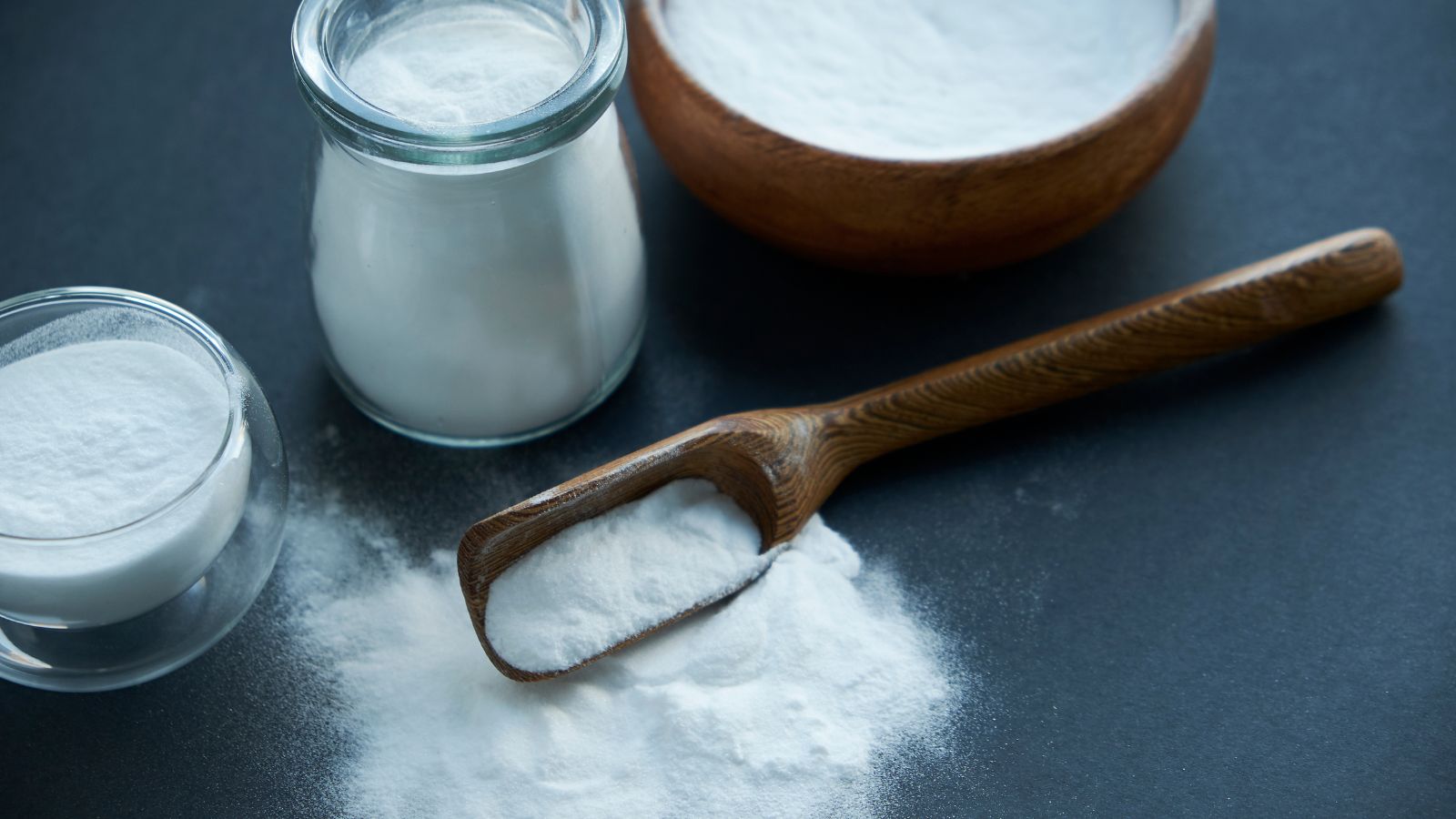
Is Baking Soda Gluten Free? Find the Facts and Safe Choices Here
Photo Credit: Canva Pro
Not sure if baking soda is gluten-free? In simple words, yes, pure baking soda does not have gluten in it. Things can get tricky with baking powder, though.
This article talks about the difference, how to read labels, and which foods are safe for people on gluten-free diets. Whether you choose to eat gluten-free or have celiac disease, this article will help you bake with confidence and safety. Now let's begin.
Is Baking Soda Gluten Free?
Photo Credit: Canva Pro
If you're on a gluten-free diet, you might be wondering if baking soda is safe for you. Good news: yes it is! Baking soda is naturally gluten-free because it doesn't come from grains like wheat or gluten containing grains. Even so, if you're very sensitive to gluten, it's still a good idea to use gluten-free baking soda to avoid cross-contamination.
What Makes Baking Soda Safe?
Baking soda is a chemical compound that is made without gluten. It is also known as sodium bicarbonate or sodium hydrogen carbonate. It works as a leavening agent in gluten free baking by reacting with acids like lemon juice to release carbon dioxide gas and help the dough rise.
-
Ingredient source: Baking soda is made from pure sodium bicarbonate, with no added wheat flour or gluten.
-
Gluten-free friendly: It’s used in recipes with gluten free flours and other gluten free products.
-
Common uses: Helps create a light, fluffy texture in cookies, cakes, and muffins.
-
Naturally safe: Because it’s a single ingredient, it’s usually safe for those with gluten sensitivity.
Watch Out for Cross Contamination
You can't get gluten from baking soda itself, but it can still come into contact with gluten while it's being made. Pick baking soda brands that you know you can trust if you have celiac disease or a severe gluten sensitivity.
-
Buy safe brands: Look for brands like Arm & Hammer or Bob’s Red Mill, which are often certified gluten-free.
-
Check the label: Make sure it says labeled gluten free on the packaging.
-
Find it easily: You’ll find it in the baking aisle of most grocery stores.
Can Celiacs Have Baking Powder?
Photo Credit: Canva Pro
There is a difference between baking soda and baking powder, which many people mix up. There are more ingredients in baking powder, and some kinds may have gluten in them. Even though most kinds are safe, you should always read the label twice if you have celiac disease or are sensitive to gluten.
Understanding the Ingredients
An acid (typically cream of tartar) and a starch are mixed together to make baking powder. When this mix gets wet or hot, it releases carbon dioxide, which helps baked goods rise.
-
Starch types: Most brands use cornstarch or potato starch, but some may contain wheat starch.
-
Function in baking: It’s a key part of gluten free baking, helping dough and batter puff up.
-
Know your labels: Always look for labeled gluten free to be safe.
Safe Options for Celiacs
There are different kinds of baking powder. Of course, not all of them are gluten-free. This is especially true if they use wheat-based ingredients or work with gluten-containing items.
-
Choose certified brands: Trusted names like bob's red mill clearly mark their products gluten free.
-
Avoid wheat starch: Even if it says “modified starch,” it might contain gluten.
-
DIY option: Mix baking soda, lemon juice, and cornstarch to make your own safe baking powder.
How Do I Know If My Baking Powder Is Gluten-Free?
Photo Credit: Canva Pro
A lot of people think baking powder is safe, but you should always read the label. Some brands may have gluten in their ingredients or be made in a facility where gluten can be spread.
Reading the Label Properly
Gluten can be hidden in words like "starch" or "modified food starch." You should know how to spot choices that aren't safe.
-
Look for wheat terms: Avoid baking powders with wheat starch or gluten ingredients.
-
Certified is better: Pick products that are labeled gluten free or certified gluten free.
-
Don’t assume: Just because it's in the baking aisle doesn’t mean it’s safe—read the label.
Better Choices for Gluten-Free Baking
If you bake with gluten-free flours, it's important to use the right baking powder. Picking safe options keeps your health safe and helps your food rise right.
-
Stick to gluten free baking soda and baking powder: These are best for gluten free baked goods.
-
Make your own: Use pure baking soda, lemon juice, and corn starch if needed.
-
Protect your health: Even a little gluten can affect those with gluten sensitivity or celiac disease.
Does Baking Soda Weaken Gluten?
Photo Credit: Canva Pro
Baking soda is an crucial role of both regular and gluten-free baking. It can change the texture of your food as well as helping the dough rise. The pH of the dough can rise when baking soda is mixed with acidic ingredients like buttermilk or lemon juice. This can alter gluten development in wheat-based recipes due to pH changes.
How Baking Soda Changes Texture
Baking soda can change the pH level of baked goods to make them softer and more tender. You can use this when working with dense flours or when you want the texture to be light and fluffy.
-
Raises pH: Increases alkalinity, which can weaken gluten in wheat-based recipes.
-
Leads to tenderness: Helps create the right texture in cookies, cakes, and muffins.
-
Perfect for gluten free flours: Balances dense mixes in gluten free baking.
-
Releases carbon dioxide: Works fast to lift batter before baking.
Useful Beyond Cooking
You can use baking soda for more than just cooking. It can also be used to clean and take care of yourself. Its powdery substance makes it useful for many beauty and household tasks.
-
Common in natural deodorant: Absorbs odor without harmful chemicals.
-
Used in cleaning: Scrubs surfaces and removes stains safely.
-
Safe for personal care: Added to toothpaste and face scrubs.
-
Trusted by most companies: Commonly used in non-GMO personal and food products from several well-known brands.
How Much Baking Powder Should You Use in Gluten-Free Baking?
The amount of leavening you use is often what makes gluten-free baking work or not. Gluten-free flours are heavier than wheat flour and need more help to rise. So, knowing how much of an ingredient like baking powder to use can make a big difference.
Ideal Leavening Ratios
Most of the time, you'll need more baking powder than flour for gluten-free recipes. This will make the rise better and the bite softer.
-
Use more for lift: Use approximately 1 to 2 teaspoons of baking powder per cup of gluten-free flour, adjusting based on recipe needs.
-
Helps with the right texture: Prevents baked goods from becoming dense or flat.
-
Try alternatives: Combine baking soda and an acid like buttermilk or lemon juice.
-
Adjust when needed: Recipes using heavier ingredients may need slightly more.
Alternatives to Consider
There are safe things you can use instead of baking powder if you run out. These help the dough rise and keep its texture without making too many changes to the recipe.
-
Try potassium bicarbonate: A low-sodium replacement for baking soda.
-
Use homemade blends: Mix 1 part baking soda, 2 parts cream of tartar, and 1 part cornstarch to make your own gluten-free baking powder.
-
Check other brands: Some non-GMO versions use alternative acids or starches.
-
Always read labels: Not all baking products are made for gluten free food products.
What Does FullyHealthy Offer for Gluten-Free Baking?
FullyHealthy is an online store that helps you find gluten-free foods that are clean and safe. It helps people who are sensitive to gluten or who have to stick to a strict diet every day. The store mainly sells well-known brands with clear labels.
Gluten-Free Baking Essentials Available
FullyHealthy has goods for baking that help people who don't eat gluten get the texture and taste they want. You can be sure that these are safe, easy to use, and clearly marked.
-
Bob’s red mill baking soda: A popular, non-GMO and gluten free option.
-
AIP baking mixes: Great for people with autoimmune conditions.
-
Low-allergen sweeteners: Like coconut sugar and maple sugar.
-
All products clearly marked: Easy to find certified and labeled gluten free options.
More Than Just Food
FullyHealthy has useful things besides food that can help you manage your whole life, not just your diet.
-
Offers personal care: Includes natural deodorant and other clean items.
-
No hidden ingredients: Products list all contents clearly for informed choices.
-
Convenient shopping: No membership or subscription needed.
-
Focused on special diets: Aimed at people who need gluten free and allergy-friendly goods.
Final Thoughts
Most kitchens have baking soda on hand, and it's an important part of gluten-free baking. It's naturally gluten-free and safe for people with celiac disease or gluten sensitivity because it's often the only ingredient. But not every baking powder is the same. Some have more than one ingredient or extra ingredients that might contain gluten.
Even if you know what the product is, you should always read the label. When picking baking soda or powder, it's important to choose items that say they are gluten-free on the label. Stick to general nutrition tips and pick brands you know you can trust to make sure your daily diet stays gluten-free and stress-free.
FAQs
Is baking soda gluten free if it has only ingredient?
Yes. If baking soda lists only ingredient as sodium bicarbonate, it’s naturally gluten free.
Can baking powder have gluten because of added ingredients?
Yes. Some baking powders have added ingredients like wheat starch or other ingredients that may not be gluten free. Always read the label.
Is baking soda a common ingredient in cooking and cleaning?
Yes. Baking soda is a common ingredient used in both cooking and cleaning, and also in personal care like natural deodorant.
Do some baking powders have multiple ingredients that cause issues?
Yes. Baking powders contain multiple ingredients, including acid and starch, and can have gluten unless labeled gluten free.
Does general nutrition advice apply to gluten free baking?
Yes. Even in gluten free baking, general nutrition advice helps you choose safe, nutrient-balanced food products and avoid unsafe added ingredients.

Leave a comment